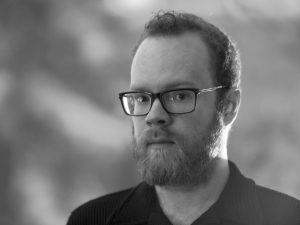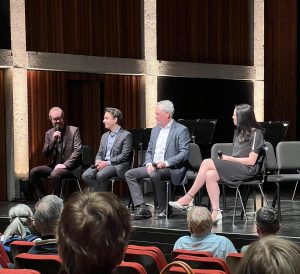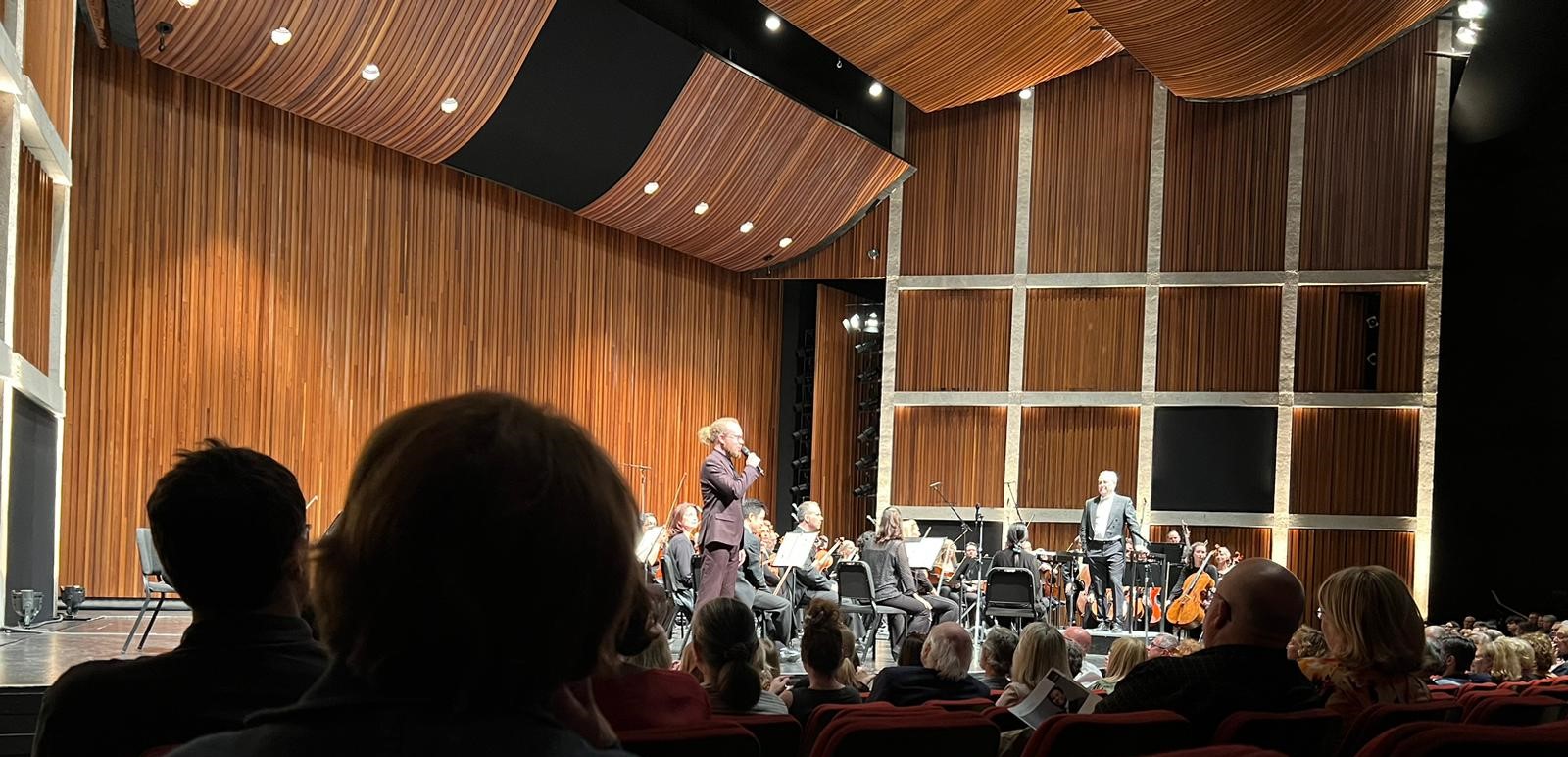CMC Ontario Regional Director Joseph Glaser sat down with HPO composer Fellow, Gavin Fraser to discuss his participation in the Hamilton Philharmonic Orchestra Composer Fellowship program.
The program was launched in collaboration with the Ontario Region of the Canadian Music Centre in our 18-19 Season. The program is aimed at connecting early career composers with professionals in the orchestral world to nurture and develop new skills through mentorship and the creation of a new work.
On May 13th, 2023, the Hamilton Philharmonic Orchestra Premiered Gavin’s work for dappled things conducted by James Summerville as part of Gavin’s fellowship with the orchestra.

Joseph Glaser: Tell me a little bit about your background, how did you get into music?
Gavin Fraser: I started with music in a fairly traditional way. I took piano lessons at a young age and even at this early time, I was much more into writing the music than I was playing it. I would trick my teachers into playing the pieces for me so I didn’t have to read them and could learn by ear. I just really hated looking at those little dots on the page, but I loved playing. I sort of burnt out of piano and classical music in general for a while, but I found my way back into it through a combination of choir singing and starting bands with friends. It was in these bands that I really started cutting my teeth in composition. It was collective composition and involved a lot of jamming and improvisation, but it allowed me to express myself creatively even though it was a very different style of music. I got more into classical composition in my undergraduate degree. I was a voice major and I had planned to do music education, but I took a course from [CMC Associate Composer] Andrew Staniland on electroacoustic composition and just fell in love with it. He then encouraged me to do a minor in composition and started giving me my first formal lessons. So, for me I came at “traditional” acoustic composition more from a popular music and electroacoustic background.
JG: You’ve been in multiple contemporary music scenes in Canada through your career. Can you comment on how the scenes might be different in Nova Scotia, St. John’s, Toronto, and Montreal?
GF: I only knew the classical music scene in Nova Scotia as a kid and that was mainly performing arts series concerts where they played a lot of the “canon” and mainly chamber music. There’s a lot of cool stuff going on there now, especially around Halifax but I wasn’t really a part of that until my residency at the Lunenberg Academy of Music Performance. In St. John’s, a lot of the scene is centered around the University so it felt very institutional there. In both places, a lot of the music scene is taken up by folk musicians from the Celtic tradition. There’s also interesting metal scenes in both places as well, which is more of what I was exposed to, to be honest. Going to an underground metal show where there are ten people going insane was more of my experience of concerts in both Halifax and St. John’s.
Montreal was a huge shift. Looking at my time at McGill retrospectively, I think I had a narrower view of what was going on there. I was very much exposed to the McGill neo-spectralist/high-modernist European style. Outside of that, though, there is a lot of experimental music happening. A lot of improvisational music in interesting venues which is the scene I now gravitate towards since coming back here. In Toronto I found the scene to be all encompassing. New music is quite strong and there are all sorts of styles at play. I had the interesting experience of going from McGill to UofT where at McGill I was considered a “neo-romantic” which I didn’t understand at all and then at UofT they considered me a “high-modernist” which I also didn’t think fit! It’s just funny how one is perceived within these scenes. In reality, my music has a bit of both, but that’s also the fun and horror of writing in the 21st Century, there is no real overarching style to go against or go with so we’re all out here making it up as we go along.
JG: Tell me a little bit about the piece. How did you represent grief in the work?
GF: I wrote this piece right after a colleague of mine passed away at a young age which was devastating. In some ways I took an intellectual approach to it and called upon classic representations. The piece opens with a straightforward Baroque “sigh” motif which is a well understood symbol in classical music. What was more surprising to me, and accurate to my experience, was how fiery and emotionally intense the material was. A lot of the material is fast moving, and the rate of change is quite high. The piece is constantly changing under your feet, stylistically, while this “sigh” motif runs through it to tie it all together. I had never done this sort of stylistic quote from the baroque before and when I first wrote it, I put it away telling myself “Absolutely not, Gavin, you’re not writing neo-baroque music now”. However, that motif just kept nagging me and I slowly came to accept that that’s what this piece needed. Once that was opened up, I used rhythms from medieval dance, a surprising turn towards some Sibelius-like music at the climax, it turned into a real tapestry of styles. However, throughout all this I was following my intuition on what the piece needed at all these moments, and it ended up being very true to the emotions I was feeling at the time. The surreal experience of life when you’re grieving perhaps doesn’t make sense from an outward perspective, but within there is some sort of strange logic guiding you through it.
JG: How do the quotations function in this piece? Do you feature quotations often in your music?
GF: I have used specific quotation before, my master’s thesis was a historical recreation of a poem and features quotations from Welsh folk tunes, I also did an opera with Barbara Hannigan where I used Seikilos’ epitaph (the oldest known complete melody) as source material. However, I only really use direct quotes when it seems appropriate to the context of the piece. I wouldn’t say that I’ve built my whole practice on quotation. I’m not doing the sort of hardcore post-modern intertextual analysis and deconstruction on this material – though I find that process fascinating. Rather, when I’m composing, I tend to amass material that inspires me, whether that’s pieces of text, or a story and sometimes that includes folk music material or ancient melodies, and in the case of this piece also stylistic allusions. So, I guess in the end the answer to your question is in fact “yes”.
JG: What is the experience like working with the HPO?
GF: It’s honestly been one of the best experiences I’ve had. I had a shorter time period for my fellowship, but I attended every performance weekend from March to my performance in May. In April I ended up running electronics for [CMC Associate
Composer] Zosha DiCastri’s Dear Life. So I got to be on stage with the orchestra running cues from my laptop. Through all this I got to develop a rapport with the orchestra members and they’re just really friendly. They’re such high-level players as well and they all put such a value and emphasis on new music. You don’t see that that often. New music is often secondary to many orchestras or relegated to the short opening work on a concert. Zosha DiCastri’s work is 25 minutes long – how many other orchestras would devote that much of a program to a relatively new work in Canada! The HPO has really successfully created a culture around new music and cultivated appreciation for it with their audience through pre-concert talks and education.

Bringing my piece to life, they were very generous with rehearsal time and very curious about the work, asking me questions and providing insight if there was anything that needed to be worked out. Abigail is also really amazing – this fellowship is really designed around providing the most practical application of the things we learned. We get meetings with many HPO staff members, giving us a behind-the-scenes view of the orchestra and how that can be helpful for us in creating works for orchestra and getting them performed. There are also non-compositional skills like how to interact with the various orchestra staff and donors, tips on public speaking, and performing for audiences interested in our music. I ended up singing my first Schubert song in 7 years at one of the orchestra’s “Talk and Tea” events. The program really pushes you out of your comfort zone to get you to the highest level of presentation for your work as well as being tied to real expectations that are put on composers. The program bridges the gap in our education as composers and really highlights how to have a career more than anything. And I was able to get all of this in only three months!
JG: What are some takeaways you have from the experience?
GF: Mainly I’m just feeling a lot more confident to start promoting myself as a composer in the professional sphere. Now I’m starting to actively sell my music for the first time instead of just giving it out and actually promoting myself. I also now have caught the orchestra bug, which I never thought would happen. Most of my work up until now is vocal music or chamber music and I love those genres, but after working with the HPO I just want to write more orchestra music. I’m feeling a pull to write a chamber orchestra piece to do something different – I’m not sure exactly what I want to explore there, but I want to push myself. In all, I’m feeling renewed and infused with confidence following this experience.

